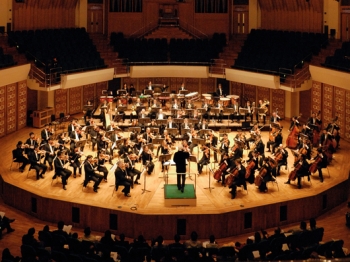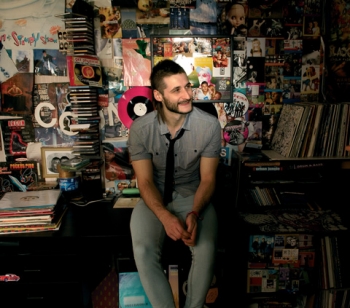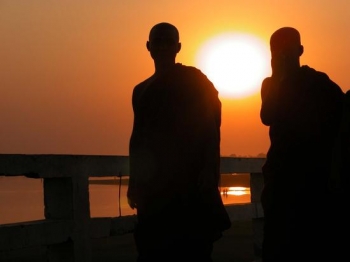Last Thursday there was a debate held about the relevance of classical music in contemporary British society. The motion at the Cambridge Union was aptly put as, “this house believes classical music is irrelevant to today’s youth.” For the motion: BBC 1 radio DJ Kissy Sellout. Against the motion: author and public intellectual Stephen Fry, known for his comedy and now for his support of humanist movements. Kissy Sellout’s arguments were fairly predictable – classical music is highbrow and snooty and involves little interaction with a well dressed, middle-to-upper class audience that is told to sit there, shut up, and enjoy the music. Unlike contemporary music, it does not address social problems, political movements, or moral dilemmas. Fry, however, attempted to argue that all music expresses a higher human condition, and that not everything relevant in life should be easy or like a heroin shot. And to whom should music be “relevant,” anyway? If classical music is marketed in the right way, it can be enormously popular: look nowhere else than China’s thriving piano culture.
Drawing what little inspiration I have from contemporary currents, I really do not think this is a very original debate. I am not criticizing it, but rather pointing out that its basic question is so universal that it is rather generic. Classical versus modern (which is a false dichotomy anyway) really boils down to a generation of young people questioning tradition and wondering why it is preserved. Tradition seems to have little apparent visibility in their lives, but this is not always correct: how many Cantopop songs feature the piano and violin for gravitas? The same has happened, albeit for more reasons, with religion. Of course, religions suffer from moral scandals in a way classical music couldn’t if it tried! Hence we see Buddhists debating whether we should maintain all the ritual, incense-burning and prostrating if we are to be compatible with modernist sensibilities. We also see Christians abandoning churches of their birth to join one where there is Gospel Rock, live bands, and Oprah-style preaching.
I admit I’m biased because I like Stephen Fry. His performances in the Black Adder series were great. But I’m also an unashamed enthusiast of classical music, from the Baroque to the Romantic to the Wagnerian. My favourites are Haydn, Vivaldi, and Chopin. But, as Fry notes, it is absurd to assume that young people deny one thing for another. Our generation is privileged to have access to an essentially limitless range of music genres. I also like musicians far more contemporary and exciting than Mozart, among them Santana (fine, maybe he’s not that great), Smashing
Pumpkins, Goo Goo Dolls, and these days Thriving Ivory. I need my classical playlist or radio when I’m writing. But when my friends are over, we need our metaphorical shot of Ferry Corsten and Kaskade. A catchy beat is not always a bad thing. I could never like one thing exclusively. Nor could I believe in the value of only one genre.
As somewhat of a conservative, I hope to do the little I can to serve the Buddhist tradition as it lives on today. I write of the Buddha’s uniqueness as a teacher to all beings, and I believe in certain tenets of Buddhism that distinguish it from other faiths. I like to share the beauty of the Dharma when the social context is appropriate, and I am willing to defend against challenges to it if civil conversation permits. Yet I’ve lost track of how much I’ve written that doesn’t involve my temple HQ, Wang Fat Ching She. Buddhism involves much more than Buddhist Asia or Europe. It involves the universe, and as such moves beyond itself. Buddhism is about transcendence, and must therefore transcend tradition.
I also disagree with my classmates and teachers about what constitutes “true Buddhism.” It holds the same bizarre assumptions as the “relevance” of classical music. Disagree all you wish with the Chinese Buddhists who speak of Zen rather than sa?s?ra, or the goodness of the natural world rather than the evil of the Six Realms. But it would be naïve to dismiss the attempts of Buddhist leaders to modernize the tradition as “inauthentic” or “unhistorical” – we are living in history already, thank you very much! We do not live separately from the past. The moment the Buddha’s compassion irrupted into human history in ancient India, Buddhism was already evolving and trying to stay relevant. Whatever twists and turns our species took, this is what we have ended up with, and if we care about it at all we need to preserve or adapt it depending on the appropriate situation (up?ya). To me, this is how one can stay inspired by the living faith without throwing away its primeval heritage. Classical music, like Buddhism, is not dead. It is far removed from our time but it is still alive in concert halls, over classical radio channels, and in the new generation of stunningly talented musicians, such as those in the Hong Kong Philharmonic.
There is also one final boon that anti-classicists (and anti-traditionalists) have overlooked: traditional music and traditional Buddhism offer quality assurance. You can criticize the mistakes Buddhists have made, but if they trace their lineage back to the olden figure of ??kyamuni, surely the cosmic charisma and compassion of the Lord’s Face override all. Similarly, there are many critics who lambast Lang Lang’s somewhat dramatic style, but they cannot conceptually criticize the work of the composers he brings to life. I am not sure we can say the same of our generation’s musical prodigies. Just contrast Mozart’s Masses with the deeply spiritual, profound message of his modern day heir, Justin Bieber:
And I'm like
Baby, baby, baby oooh
Like baby, baby, baby nooo
Like baby, baby, baby oooh
I thought you'd always be mine (mine)
I'm gone (Yeah Yeah Yeah, Yeah Yeah Yeah)
All I'm gone (Yeah Yeah Yeah, Yeah Yeah Yeah)
Now I'm all gone (Yeah Yeah Yeah, Yeah Yeah Yeah)
Now I'm all gone (gone, gone, gone...)
I'm gone…
The sheer creativity would have enchanted Amadeus himself.


















